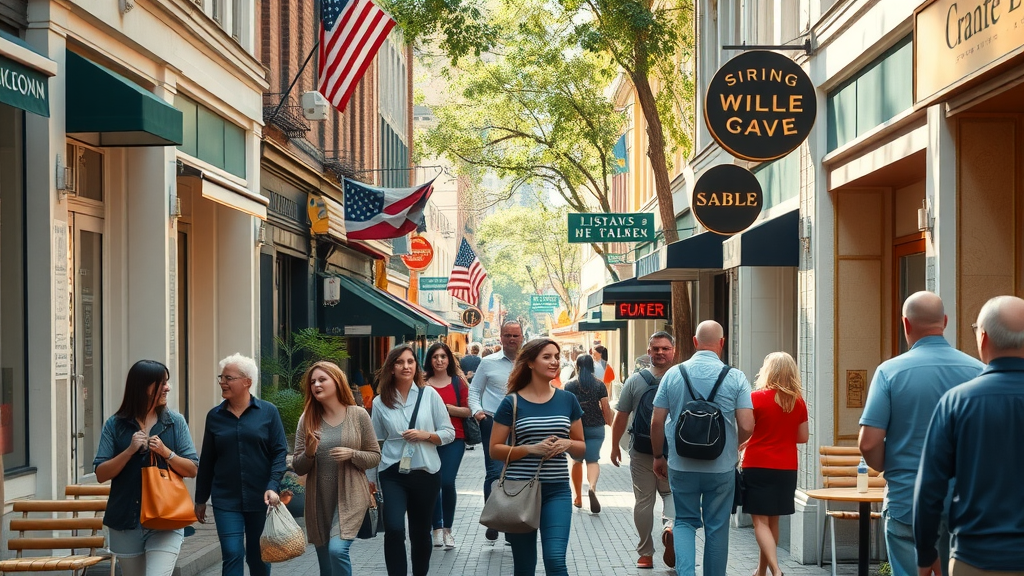Startling Statistic: Did you know that 97% of consumers search online to find a local business, and nearly 78% of mobile local searches result in an offline purchase? In today’s digital-first world, local marketing strategies aren't just a competitive edge—they’re the difference between being the neighborhood favorite and getting lost in the crowd. If you’re a small business owner looking to thrive in your local market, this guide delivers actionable, proven tactics to help you connect with your local community and transform your growth trajectory.
Local Marketing Strategies: Unlocking Rapid Growth for Local Businesses
- Did you know that 97% of consumers search online to find a local business, and nearly 78% of mobile local searches result in an offline purchase? Discover why effective local marketing strategies are the true game changers for local businesses and small businesses in today’s competitive digital landscape.

Key Outcomes: What You Will Learn About Local Marketing Strategies
- Essential components of winning local marketing strategies
- How local businesses can dominate their local market
- Actionable steps to tailor marketing strategies to target audiences
- Best practices for leveraging digital marketing, local SEO, and social media
- Measuring and scaling small business marketing strategy for continuous growth
Understanding Local Marketing Strategies for Maximum Impact
Defining Local Marketing: What Makes A Strategy Local?
- Explore the nuances between local marketing and digital marketing—learn how local marketing is uniquely designed for local market conditions, local community outreach, and relevance for small businesses and business owners.

Local marketing strategies stand out from general digital marketing by focusing on the needs and preferences of a specific local market or community. Unlike broader campaigns, these strategies are tailor-made for the unique characteristics of your neighborhood or city. This involves understanding local trends, regional competitor activity, and the specific challenges faced by small businesses and local businesses. Effective local marketing incorporates community outreach and relevance, allowing business owners to build trust, increase brand awareness, and create authentic relationships with their immediate local customer base. A truly local strategy recognizes that proximity and personal touch are invaluable assets for small businesses looking to position themselves at the heart of the local audience.
Unlike digital marketing, which often strives for reach at scale, local marketing harnesses the power of specificity. Whether it’s sponsoring a little league game, optimizing your Google Business Profile to appear in “near me” searches, or leveraging hyperlocal content, the difference lies in relevance and resonance. Local businesses using these personalized marketing strategies not only attract more local customers but also develop loyal community advocates. Business owners who embrace this targeted approach find that their marketing efforts yield higher ROI through deeper engagement with the local community.
Real-World Examples of Effective Local Marketing Strategies
- Case studies of small businesses using local marketing, local SEO, and personalized marketing strategies to achieve outstanding results in their local market.
Consider a neighborhood bakery that increased foot traffic by running targeted geo-ads and partnering with schools for fundraising events. By combining local SEO—that ensured their bakery showed up in search engine results for “fresh bread near me”—with authentic community activities, they became the go-to spot for families and local professionals. Another standout is a boutique fitness studio that leveraged Google Business profile optimization and encouraged clients to leave online reviews, pushing them to the top of local search listings.
Small businesses that adopt these local marketing tactics aren’t just attracting potential customers—they’re creating lasting customer relationships. A pet supply store, for instance, saw huge growth after sponsoring pet adoption events and sharing stories on social media. The results? A loyal local customer base and recognition as a trusted voice in the community. These real-world successes showcase how smart local marketing strategies deliver powerful, measurable growth for local businesses when rooted in understanding their local market.
Building a Comprehensive Local Marketing Strategy
Setting Goals for Small Business Success in Your Local Market
- Learn how business owners can define clear, measurable objectives for local marketing efforts, including brand awareness, sales growth, and community engagement.
Setting the right goals is the cornerstone of successful local marketing strategies. Business owners must clearly define what they hope to achieve—whether that’s increasing local search visibility, driving more walk-in customers, improving brand awareness within a local audience, or boosting community participation. These objectives guide all marketing efforts, ensuring tactics are not just random acts but steps toward impactful, measurable results. For example, a local business might aim to double positive customer reviews on Google or boost social media engagement by 50% in three months.
It’s critical that goals are both specific and quantifiable. Smart small businesses choose objectives tied to metrics like new leads generated through local SEO, attendance at sponsored events, or revenue increases from hyperlocal content campaigns. Measurable goals enable business owners to evaluate the ROI of each marketing strategy and adapt quickly for maximum impact in their local market. This approach keeps your marketing efforts focused, accountable, and primed for long-term growth.
Identifying & Targeting Your Ideal Local Market Audience
- Analyze the target audience for your local business, and leverage data insights to craft a marketing strategy that resonates locally.

No local marketing strategy succeeds without deeply understanding your target audience. Analyze demographic data, buying behavior, and local community trends to identify your potential customers and learn what matters most to them. Tools like social media insights, Google Analytics, and customer surveys deliver vital clues about preferences, pain points, and how your small business fits into the lives of local residents. Tailoring your digital marketing and promotional efforts around these insights ensures your messages are relevant and timely, making it easier to build trust and drive results.
Once you’ve profiled your ideal local customer, segment your marketing tactics to align with their specific interests and lifestyles. For instance, a gym targeting college students might run back-to-school fitness promotions, while a pet store could offer loyalty programs for neighborhood dog walkers. Personalization helps distinguish your local business from generic big-box competitors, fostering a loyal and engaged local customer base that returns again and again for products and services specifically tailored to their needs.
Choosing Marketing Strategies That Fit Your Local Business
- Evaluate strategies such as local SEO, google business profile optimization, and social media marketing for efficiency and fit to your local business profile.
Not every marketing tactic will suit every business owner or local market. Assess your resources, business goals, and the needs of your community to choose marketing strategies that offer maximum return with minimal waste. For many local businesses, a strong foundation begins with local SEO and maintaining an up-to-date Google Business Profile. These tactics ensure your business appears prominently in local search results when potential customers are searching for products or services like yours.
Supplement digital marketing with social media marketing, local event sponsorships, and partnerships with nearby businesses for even greater impact. Experiment with a mix of organic and paid strategies, from targeted Facebook ads to in-person community events, to discover what best resonates with your specific local audience. Most importantly, stay agile—regularly review what works and adapt your marketing strategy as your business and local community evolve.
Winning Local SEO and Search Engine Optimization Tactics
Optimizing for Local Search: Google Business and Beyond
- Maximize visibility by using local SEO, optimizing your google business profile, and ensuring all local marketing efforts are discoverable in the local market.

Visibility in local search is a game-changer for small businesses. Begin by claiming and fully optimizing your Google Business Profile—add high-quality photos, business hours, service categories, and regularly update information to rank higher in local SEO results. Encourage satisfied local customers to leave positive reviews, as these directly influence your position in Google Maps and local search engine results. Consider using keywords that reflect your geographic location (for example, “plumber in Austin” or “best bakery in Brooklyn”) to improve discoverability and capture "near me" searches.
Local SEO goes beyond Google. List your small business on Bing, Apple Maps, and review sites like Yelp. Consistency is key: ensure your Name, Address, and Phone Number (NAP) are identical across platforms. Include localized content on your website, such as blog posts about community events or neighborhood guides, to strengthen your relevance and authority for local searches. By making your business easy to find and trust online, you pave the way for more foot traffic, calls, and website visits from local customers ready to buy.
Leveraging Search Engine Optimization for Local Businesses
- Practical ways to implement SEO, including citation building, review management, and organic local keyword targeting.
Effective search engine optimization is more than just keywords; it encompasses citation building, review management, and tailored web content. List your local business on authoritative directories—such as Google, Yelp, and industry-specific platforms—to build trust with search engines and enhance your visibility. Encourage a steady stream of new customer reviews by integrating email or SMS requests into your sales process, which helps build a positive online reputation and influences local SEO ranking significantly.
Organic keyword targeting is equally crucial. Research what local customers are searching for and incorporate those phrases naturally into your content—especially landing pages and blog posts. Don’t forget to build trust by responding to all customer reviews (both positive and negative) and sharing customer success stories. Regularly monitor your website’s performance on search engines using analytics tools, adjusting your engine optimization tactics to respond to changing trends in your local market. Small businesses that master these aspects of search engine optimization enjoy sustained online visibility and increased in-store or online sales.
Social Media Mastery: Powering Your Local Business
Local Marketing through Social Media: Engaging Your Local Community
- Actionable strategies for using social media marketing to reach, engage, and build trust with a local community.

Social media is no longer a luxury—it’s a lifeline for local businesses aiming to engage their local community. Platforms like Facebook, Instagram, and Nextdoor allow business owners to build authentic relationships, showcase their products, and instantly respond to local customers’ questions or feedback. Your marketing strategy should include regular posting of behind-the-scenes content, customer testimonials, and spotlights on local events or partnerships. These tactics humanize your brand, making it relatable and trustworthy in the eyes of your local audience.
To maximize local reach, encourage shares, reviews, and user-generated content. Host contests or challenges that invite community participation, such as photo submissions or tagging your business location. Use platform tools (like Instagram geotags, Facebook Events, or local hashtags) to boost visibility among potential customers nearby. By consistently engaging your local customer base on social channels, you lay the foundation for word-of-mouth referrals and sustainable loyalty.
Media Marketing Tools for Driving Local Engagement
- Tools and tips for small businesses to execute targeted local marketing strategies using paid and organic social campaigns.
Choose the right combination of media marketing tools to execute your local marketing strategies effectively. Free resources like Canva let you craft visually engaging posts, while scheduling tools like Buffer or Hootsuite help you remain consistent with content delivery. Social media platforms now offer robust built-in analytics, enabling you to assess which posts resonate most with your local audience and adjust your strategy in real time.
Paid options—including Facebook and Instagram Ads—allow hyperlocal targeting based on geographic radius, age, interests, and even purchasing behaviors. Experiment with both organic and paid promotions; for instance, boost posts highlighting customer success stories or run local discounts exclusively for followers. Social media marketing turns every small business into its own media hub, driving local engagement and building brand awareness rapidly within your target market.
Harnessing Local Influencers and Partnerships to Grow Your Market
Collaborating with Local Influencers to Reach Target Audience
- Identify local market influencers who align with your business profile and leverage their audience for expanded reach.

Local influencers are often trusted voices within their communities, making them powerful partners for expanding your reach and credibility. Seek out individuals whose values align with your business profile and who genuinely engage your target audience—this might include neighborhood bloggers, local athletes, or micro-influencers with strong engagement in your city. Collaborations might include social media takeovers, event co-hosting, or product reviews, providing authentic exposure that can’t be easily matched by traditional ads.
Leverage their audience to introduce your brand to new local customers, while also gaining creative perspectives on what resonates locally. Successful collaborations are built on authenticity: encourage influencers to share their actual experiences rather than relying on scripted endorsements. By integrating influencer marketing into your local marketing strategies, you tap into existing trust networks, setting your business up for accelerated growth and recognition in your local market.
Strategic Partnerships: Building Trust in the Local Community
- Co-market and co-brand with other small businesses—share events, promotions, and cross-referrals to deepen roots in your local community.
Strategic partnerships multiply the impact of your local marketing initiative. Co-hosting events, cross-promoting services, or sharing marketing resources with neighboring businesses strengthens your ties to the local community and builds trust with potential customers. For example, a coffee shop and bookstore might create joint loyalty cards or a hair salon could run exclusive discounts for gym members in the same shopping district. Such collaborations are win-win, amplifying brand exposure while delivering extra value to your customer base.
Beyond campaigns and promotions, partnerships foster a greater sense of community within your local market. Hosting local charity drives, supporting nearby schools or sports teams, and co-sponsoring community events not only boost your visibility but position your business as a committed member of the neighborhood. Over time, these relationships pay dividends in terms of customer retention, positive word-of-mouth, and the ability to weather challenges as a united community.
Crafting Hyperlocal Content: Marketing Strategy for Community Connection
Creating Location-Specific Content for Search Engine Optimization
- Develop city, neighborhood, or event-specific content that helps local businesses appear in 'near me' and local search results.
Hyperlocal content amplifies your relevance with both customers and search engines. Develop blog posts, landing pages, or videos tailored to popular neighborhoods, seasonal events, or local happenings—think “Best Family Activities in [Your City]” or profiles on long-time community members. This approach increases your chances of ranking highly in “near me” searches and strengthens your overall local SEO presence. Make use of local landmarks, colloquial language, and references that local customers immediately recognize and connect with.
Location-specific content serves as a magnet for potential customers seeking authentic recommendations in your area. By delivering real value—whether it’s guides, event calendars, or spotlights on community heroes—you build authority and trust with your audience, setting your local business apart from national competitors who lack true neighborhood insight.
Using Local Events and Stories in Digital Marketing
- Incorporate community news, charitable activities, and customer stories to build trust and authority in your local market.

There’s nothing more compelling than real community stories. Use your digital marketing channels to share news about local events, charitable initiatives, and memorable customer experiences. For instance, spotlight regulars who’ve been with your business since day one, feature team members who volunteer at nearby schools, or celebrate milestones in partnership with the local community. This kind of storytelling not only humanizes your brand but turns ordinary moments into lasting connections with local customers.
When you leverage these narratives in email campaigns, social media marketing, and even on your website, you build trust and encourage engagement. Local businesses that champion the successes and needs of their community become go-to resources and earn unwavering customer loyalty—foundations of any sustainable local marketing strategy.
Measuring and Refining Your Local Marketing Strategies
Track Key Metrics for Local Marketing Success
- Monitor campaign KPIs such as website visits, local search rankings, conversions, and customer reviews to iteratively enhance your marketing strategies.

Without consistent measurement, even the best local marketing strategies can go off track. Identify key performance indicators (KPIs) that align with your goals—these might include website traffic from your target market, improvement in local search rankings, growth in social media engagement, or the number of positive customer reviews. Tools like Google Analytics, Facebook Insights, and customer relationship management software provide critical data to track results and spot trends.
Regularly review your metrics and compare them to initial benchmarks. If a particular digital marketing campaign leads to a surge in website visits but low conversions, adjust your messaging or target audience for better results. By continuously monitoring, evaluating, and refining your marketing efforts, small businesses ensure every dollar and minute spent fuels tangible growth in the local market.
Scaling Winning Local Marketing Strategies for Small Businesses
- Expand on proven marketing strategies as your business grows—regionalize your marketing strategy and broaden your target audience.
Once you’ve identified which local marketing strategies yield real results, it’s time to scale up. Start by expanding your reach to neighboring communities, adjusting your messaging to appeal to a regional audience while maintaining the personal touch that made your initial campaigns successful. Invest more in high-performing tactics, such as boosting content that resonated on social media or reinvesting profits from an event series into larger sponsorships.
Look for efficiency gains as you grow—consider marketing automation or outsourcing content creation so you can focus on strategic growth. Track new metrics as you broaden your target audience, such as regional keyword rankings or performance of franchise locations versus single sites. This data-driven expansion ensures your small business remains agile, innovative, and closely connected to the communities you serve as you scale.
The Role of Technology in Smarter Local Marketing Strategies
Utilizing Marketing Automation for Digital Marketing Success
- How tools and platforms simplify local business operations, customer follow-up, and campaign tracking.

Marketing automation is revolutionizing how local businesses operate. Tools like Mailchimp, HubSpot, or ActiveCampaign simplify everything from email campaigns to social media scheduling. They offer time-saving automation for repetitive tasks, allowing business owners to focus more on creative strategy and less on manual work. Automated customer follow-up—such as birthday offers or abandoned cart emails—ensures your local customer base stays engaged without constant intervention.
Technology also improves campaign tracking, providing real-time performance dashboards and actionable insights. With a clear view of what’s working, small businesses can make data-driven decisions, refine marketing tactics rapidly, and create highly targeted campaigns tailored to their local market. Embracing these platforms is essential for staying competitive in today’s digital marketing landscape.
AI, Chatbots, and Real-Time Engagement in Local Business Marketing
- Implement smart tech to enhance the customer experience, answer questions, and deliver personalized offers in real-time.
AI and chatbots are no longer futuristic—they’re fundamental to delivering standout customer experiences in the local market. Chatbots answer queries 24/7, helping customers book appointments, receive product recommendations, or get support instantly. Automated tech tools can personalize offers based on a customer’s browsing history or location, improving the odds of conversion and deepening customer loyalty.
Real-time engagement doesn’t just offer convenience; it shows customers you value their time and are responsive to their needs—two critical factors for small businesses competing against bigger brands. Integrate these smart solutions into your local marketing strategies to connect, serve, and delight your community every step of the way.
People Also Ask: Local Marketing Strategies Explained
What is a localized marketing strategy?
- A localized marketing strategy tailors marketing efforts to cater to the unique needs, cultural sensibilities, and consumer behaviors of a specific geographic area or community. By focusing on the local market, businesses foster stronger relationships and increased loyalty among customers in their immediate vicinity.
What are the 4 main marketing strategies?
- The four main marketing strategies are product, price, place, and promotion—commonly known as the 4 Ps. In the context of local marketing, these are further adapted to fit the local business environment and community.
What is the 3-3-3 rule in marketing?
- The 3-3-3 rule in marketing refers to capturing a new customer’s attention within 3 seconds, conveying your message in 3 lines, and giving 3 choices or actions to keep engagement high and drive conversions.
What is an example of LSM marketing?
- Local Store Marketing (LSM) involves highly targeted efforts at the community level. For example, a local coffee shop may sponsor school events, offer exclusive deals to nearby offices, and use social media to attract customers located within walking distance.
Video: Building a Local Marketing Strategy from Scratch
- A step-by-step visual guide to launching powerful local marketing strategies for local businesses—from audience research to campaign execution.
Video: Local SEO Tips Every Small Business Should Implement
- In-depth exploration of local SEO best practices—with practical examples and real-life case studies to inspire your next local marketing push.
Video: Real-World Social Media Marketing for Local Market Domination
- Insider tips and tricks for social media marketing, demonstrating how business owners can boost local business recognition and attract new customers through social channels.
Expert Insights: Quotes on Winning Local Marketing Strategies
"Local marketing strategies focused on authentic community connections consistently deliver the highest ROI for small businesses in today’s digital-first world." – Digital Marketing Expert
"Understanding your local market isn’t just a competitive advantage—it’s the foundation of every successful local business marketing strategy." – Small Business Consultant
Table: Comparing Key Local Marketing Strategies for Small Businesses
| Strategy | Best for | Cost | Expected ROI |
|---|---|---|---|
| Local SEO | All local businesses | Low | High |
| Google Business Profile | Location-based businesses | Free | High |
| Social Media Marketing | Small businesses | Varies | Moderate |
| Local Partnerships | Community-focused business | Low | Moderate to High |
Top 10 Local Marketing Strategies for Dominating Your Local Market
- Optimize local SEO and search engine presence
- Claim and manage your google business profile
- Run geo-targeted digital marketing campaigns
- Host and sponsor local events
- Collaborate with other local businesses
- Utilize influencer marketing to expand reach
- Publish hyperlocal content and stories
- Engage your local community on social media
- Collect and showcase customer reviews
- Implement referral and loyalty programs
Frequently Asked Questions on Local Marketing Strategies
- How do small businesses use digital marketing to compete in the local market? Small businesses leverage digital marketing tools like local SEO, social media marketing, and email campaigns to reach potential customers in their immediate area. By honing in on local events, promotions, and personalized content, they make an impact that rivals larger brands, often with more agility and authenticity.
- What role does a Google Business Profile play in local marketing strategies? A Google Business Profile dramatically increases visibility in local search results, making it easier for local customers to find information such as hours, directions, reviews, and promotions. It helps build trust, drives foot traffic, and anchors your digital marketing efforts for discoverability.
- Which marketing strategy is best for rural local businesses? Rural local businesses often succeed with a blend of Google Business Profile optimization, local SEO, community event sponsorships, and direct outreach such as flyers or SMS marketing. These strategies help foster personal relationships and attract loyal local customers.
- How can small businesses identify their target audience for hyperlocal campaigns? Use customer surveys, sales data, local market research, and social media analytics to understand who your best customers are. Identify trends in demographics, preferences, and behaviors, then tailor campaign messaging and offers to appeal to this specific audience.
Elevate Your Growth With Advanced Local Marketing Strategies
- Achieving long-term success in the local market requires local businesses to master both foundational and advanced marketing strategies, integrating digital marketing innovation and authentic local relationships.

Ready to Drive Results With Powerful Local Marketing Strategies?
- Ready to turn your vision into results? Book your free strategy session today.
Actionable Next Steps: Start with one high-impact local marketing strategy—like Google Business Profile optimization or a targeted social media campaign—track your results, and scale what works. Your path to local market domination begins now!
 Add Row
Add Row  Add
Add 



Write A Comment